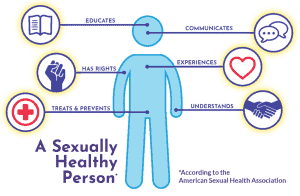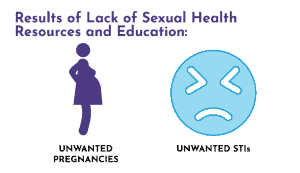Medically reviewed by Sophia Yen, MD, MPH – Written by Pandia Health Editorial Team. Updated on February 24, 2021
In this guide:
- What are the characteristics of a sexually healthy person?
- Why is sexual health so important?
- How else is sexual health defined?
- What are the consequences of poor sexual health?
- How can someone improve their sexual health?
When someone hears the term, “sexual health,” they may think it refers only to avoiding an unplanned pregnancy or preventing Sexually Transmitted Infections (STIs). While these areas are components, sexual health is really an umbrella term that encompasses many facets of a person’s physical and emotional well-being surrounding sex and sexuality.
On September 4th, 2012, the World Association of Sexual Health launched World Sexual Health Day to bring awareness to these issues and to help people of all sexual orientations fully understand what it all means to be a sexually healthy person.

What are the characteristics of a sexually healthy person?
The American Sexual Health Association defines someone who is sexually healthy as possessing the following characteristics, behaviors, and belief systems around sex and relationships:

They understand that sexuality is a natural part of someone’s life and involves more than just sexual behavior.
Your sexuality is much more than your libido (a.k.a sex drive). Part of understanding your sexuality is taking control of your sexual health – this may include, but is not limited to, regularly getting tested for STIs and being on top of your reproductive health (that is where Pandia Health comes in!).

They recognize that everyone has sexual rights.
Everyone has different preferences—including who they like, what they enjoy sexually, and what they choose to do with their body. It is important to respect each person’s preferences, even if they are different from your own!
They make safe, reliable efforts to prevent unintended pregnancy and STIs.
When you choose to be sexually active, you also choose to take on the responsibility of potentially becoming pregnant and/or spreading or receiving STIs. With that said, taking care of your physical health (i.e. using contraception and maintaining good hygiene) is necessary for the safety of both yourself and your partner.

They are willing to utilize sexual health resources.
Being armed with the necessary information on how to best take ownership of your sexual health will lead to you being a more sexually healthy person overall. In general, resources on topics like consent, sexuality, and sex positivity exist to help individuals become more sex positive.
They can experience sexual pleasure, satisfaction, and intimacy when they desire.
Key word here—”desire.” Someone who is sexually healthy not only knows that they are allowed to experience sexual pleasure, but also feels comfortable creating boundaries (not wanting to have sex is okay too). Consent is sexy!
They can openly communicate about their sexual health and needs with intimate partners and healthcare providers when needed.
Being upfront about your sex life may seem scary, but it is important to do so in order to maintain healthy relationships with yourself and others. Additionally, the more open you are with your healthcare providers, the more likely you are to receive the best care possible.
These are worthy goals to set and obtain in order to make sexual health a priority. Not everyone will be able to check off each item from the list, and that’s not necessarily an indicator that they are lacking in sexual health or are otherwise unhealthy.
But generally, safety, both physical and emotional, and happiness for everyone in a sexual relationship are the keys to living a sexually healthy, authentic life. Generally speaking, sexually healthy individuals are willing to express their own desires while respecting the preferences of others.
Why is sexual health so important?
Sexual health is important because it enables people individuals to take charge of their reproductive health, and their emotional well-being surrounding their intimate relationships. There are several components involved in becoming sexually healthy, some of which include education, safety, and communication (both with healthcare providers and intimate partners)

Education
Sex education is taught in many schools throughout the United States. However, the curricula typically vary and may only teach students about the possibility of becoming pregnant or spreading STIs when they have sex. With that said, individuals may need to take sexual education into their own hands in order to not only protect themselves from unintended pregnancy and STIs, but also to learn their own sexual preferences.
Safety
When discussing sexual health, safety is a term that may refer to prevention of unintended pregnancy and STIs or protection from sexual abuse. Sexually healthy individuals engage in safe sex practices.
While the best way to prevent unplanned preganancy is to practice abstinence (i.e. not having sex), this is not realistic for many indivdiuals. Thankfully, another successful technique is implementing contraception. Hormonal methods, such as the pill, patch, ring, and IUD, are great options for women who want to have greater control over their reproductive health, as they are very effective at preventing pregnancy when used as prescribed. However, these methods do not protect individuals from the spread of STIs. Therefore, it is necessary to use an additional form of contraception, such as condoms during penetrative sex (i.e. penis-to-vagina or penis-to-anus).
Unfortunately, there is no explicit way to prevent sexual abuse, as this is far too common both in the United States and throughout the world. However, this does not mean that sex has to be seen as something scary. If you experience something that makes you feel uncomfortable, it is okay to stop. Sex should be enjoyable for everyone involved and if that is not the case, then something likely needs to change.
If you or someone you know is experiencing sexual abuse, consult a trusted individual if you can. If you would like to stay anonynous, you can contact the National Sexual Assault Hotline at 800-656-4673 or online.rainn.org.
 Communication
Communication
When an individual becomes sexually active, it’s vital that they communicate with their doctors and healthcare team. While it may feel uncomfortable to discuss such an intimidating topic, the more open you are, the more a healthcare professional will be able to provide informed, effective care. It is especially important to consult a doctor if you are considering hormonal birth control. Once they have an idea of your health background and current lifestyle, they can prescribe something they feel will be best for you.
It is also important to have strong communication with your partner. Relationships thrive when both partners are respectful, and communicate their needs, expectations, and boundaries. A sexually healthy individual will feel comfortable expressing honesty to their partner whether this means telling them that they like or dislike a certain sex position, admitting to having an STI, or simply stating that you do not want to have sex. The more comfortable both partners feel with each other, the stronger a relationship can become.
What makes a healthy sexual relationship?
A healthy sexual relationship revolves around clear lines of communication
rmore, both partners should feel comfortable communicating what they like and dislike regarding sex. In general, being in a sexual relationship should provide you with a sense of well-being, as it meets both your sexual and emotional needs.
Another way to practice good sexual health is by taking care of your body and doing engaging in activities that make you feel sensual on your own. This may look different for every person, but some techniques may include taking a warm bath, purchasing a vibrator or other sex toys, and reading or watching erotic content. It is totally healthy and normal to embrace your desires. There is often a negative stigma around female mastubration, but it is a great tool not only for exploring sexual pleasure, but also for decreasing stress.
Having a healthy sexual relationship starts with taking care of yourself!
Once you discover what makes you feel good, you can focus on forming healthy relationships.
How else is sexual health defined?
Sex is becoming established as part of the human experience. While sexual health previously referred to the absence of sexual dysfunction or STIs, it now incorporates socioemotional components such as attraction (a.k.a who you like) and pleasure (a.k.a what makes you feel good).

Moving into the future, sexual health will come to define a positive, respectful approach to sexual behavior and relationships. Furthermore, sex should be enjoyable for both parterns – if one is not interested, they should not feel pressured to participate. The sexual rights of all people must be recognized and protected in order to maintain a positive sexual environment. Universally, sexual health is an integral component of human rights.
Unfortunately, the fact that new definitions of sexual health must include an absence of coercion or discrimination shows just how far society needs to move forward for more people to be considered sexually healthy. The prevalence of so many negatives regarding sexuality in the average person’s life is a testament to how important improving sexual health is.
What are the consequences of poor sexual health?
Poor sexual health can lead to a host of adverse consequences. Lack of access to education and/or resources can lead to unintended pregnancy and STIs.
Additionally, failing to communicate with doctors can lead to long-term health complications For instance, it is important to be open with your healthcare provider about your sexual health, as they can help you make sure it is in check. Similarly, engaging in a relationship that is unfulfilling can ultimately cause poor mental health and in turn, decrease one’s overall quality of life. With that said, being honest both with your partner and yourself is an extremely necessary part of maintaining good sexual health.

How can someone improve their sexual health?
Sometimes, it can be difficult to speak about sensitive subjects to a sexual partner. Shame and negative social conditioning may cause individuals to ignore their needs or those of their partner. In some cases, it may be beneficial to speak to a therapist who is knowledgeable and supportive of sexual health.
A therapist can provide an individual with the tools they need to help them communicate their boundaries and expectations respectfully, and in a safe, judgment-free environment.
It’s also important to speak to a doctor about specific sexual health needs. If you are not sure where to start, you can check out one of the many organizations that exist to support individuals through their sexual health journey.

What’s the takeaway?
Sexual health is an integral part of living an authentic life. Making it a priority can significantly improve an individual’s emotional, physical, and mental well-being, as well as enhance their intimate relationships.
How Can Pandia Health help?
One way to take charge of your reproductive health is by using birth control. If you are not already signed up for our FREE delivery service, check it out today! You can also set up an online consultation with one of our expert doctors if you live in AZ, CA, CO, FL, GA, IL, MI, NV, TX, TN, PA, WA, or WY, . With Pandia Health, you can feel confident that your reproductive health needs are our number one priority!
Frequently Asked Questions
What does being sexually active mean?
Being sexually active does not solely mean engaging in penis-in-vagina penetration. Oral sex, anal sex, and manual sex (like a i.e. hand job) also counts as being sexually active.
Why is sex important?
Without it, there would be no life. It makes for a good marriage. It brings people together. It’s good for stress relief.
What is considered sexually active?
If you have ever had engaged in oral, vaginal, or anal sex.
Is sex good for you?
Yes! There are many health benefits of sex such as such as reducing stress, improving sleep, and even boosting your immune system. Check out more benefits here.
What is considered a healthy sex life?
In its simplest form, a healthy sex life is present when an individual has sex when they want without pressuring another individual (or vice versa), spreading STIs, or failing to protect their body (i.e. not using condoms or birth control when trying to avoid pregnancy).
Disclaimer: The views expressed in this article intend to inform and induce conversation. They are the views of the author and do not necessarily represent the views of Pandia Health, and are for informational purposes only, even if and to the extent that this article features the advice of physicians and medical practitioners. This article is not, nor is it intended to be, a substitute for professional medical advice, diagnosis or treatment, and should never be relied upon for specific medical advice.

